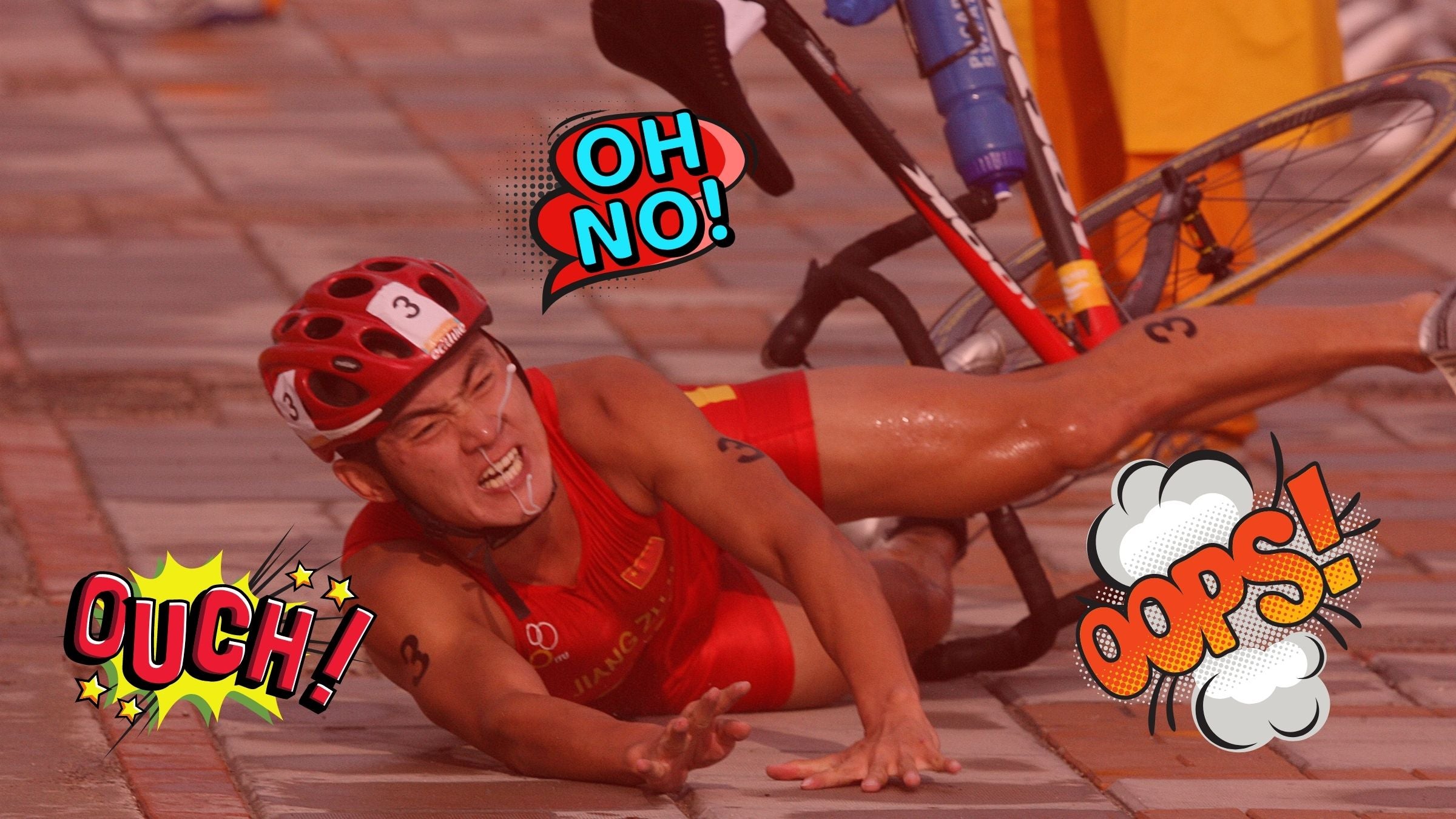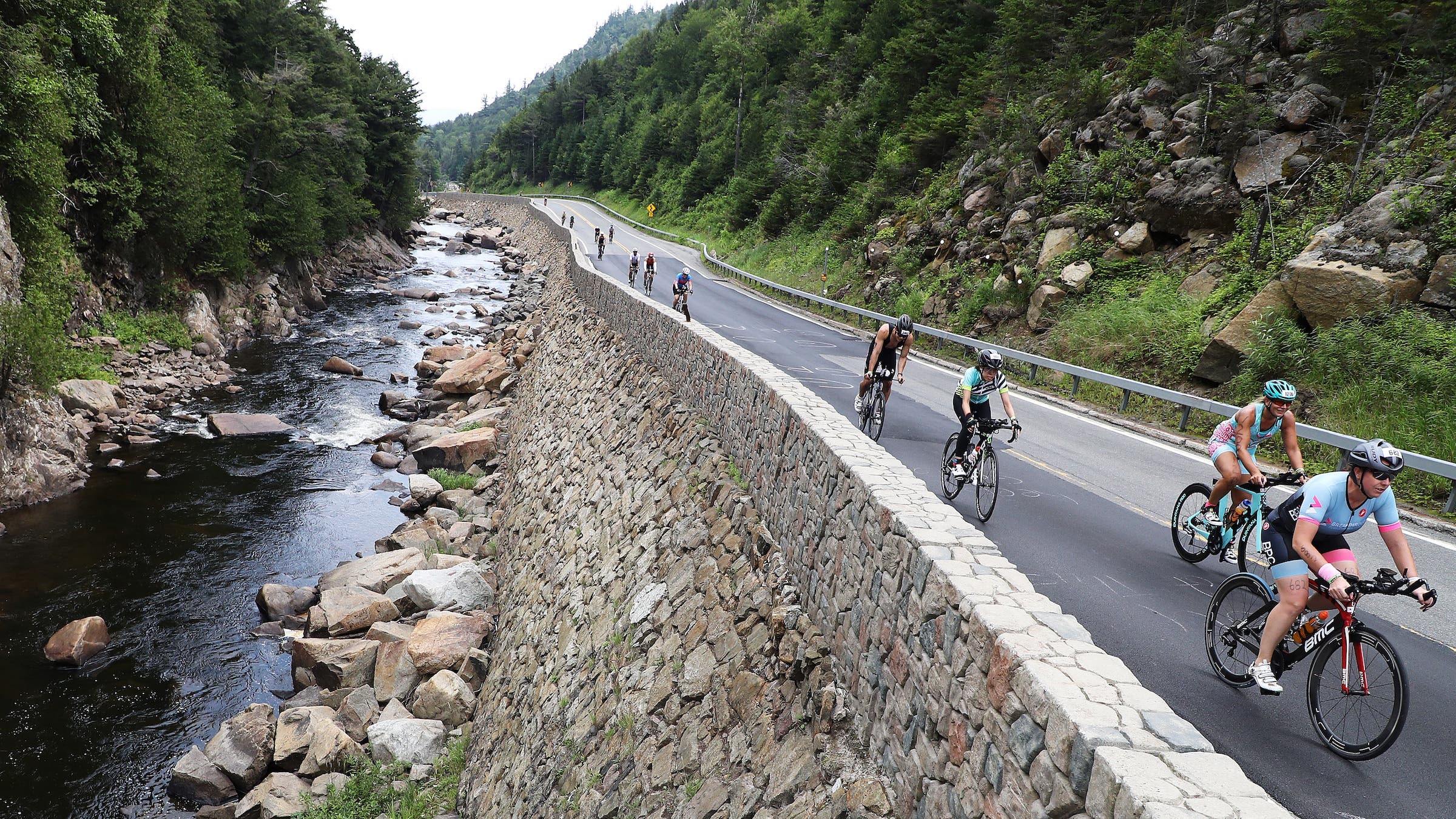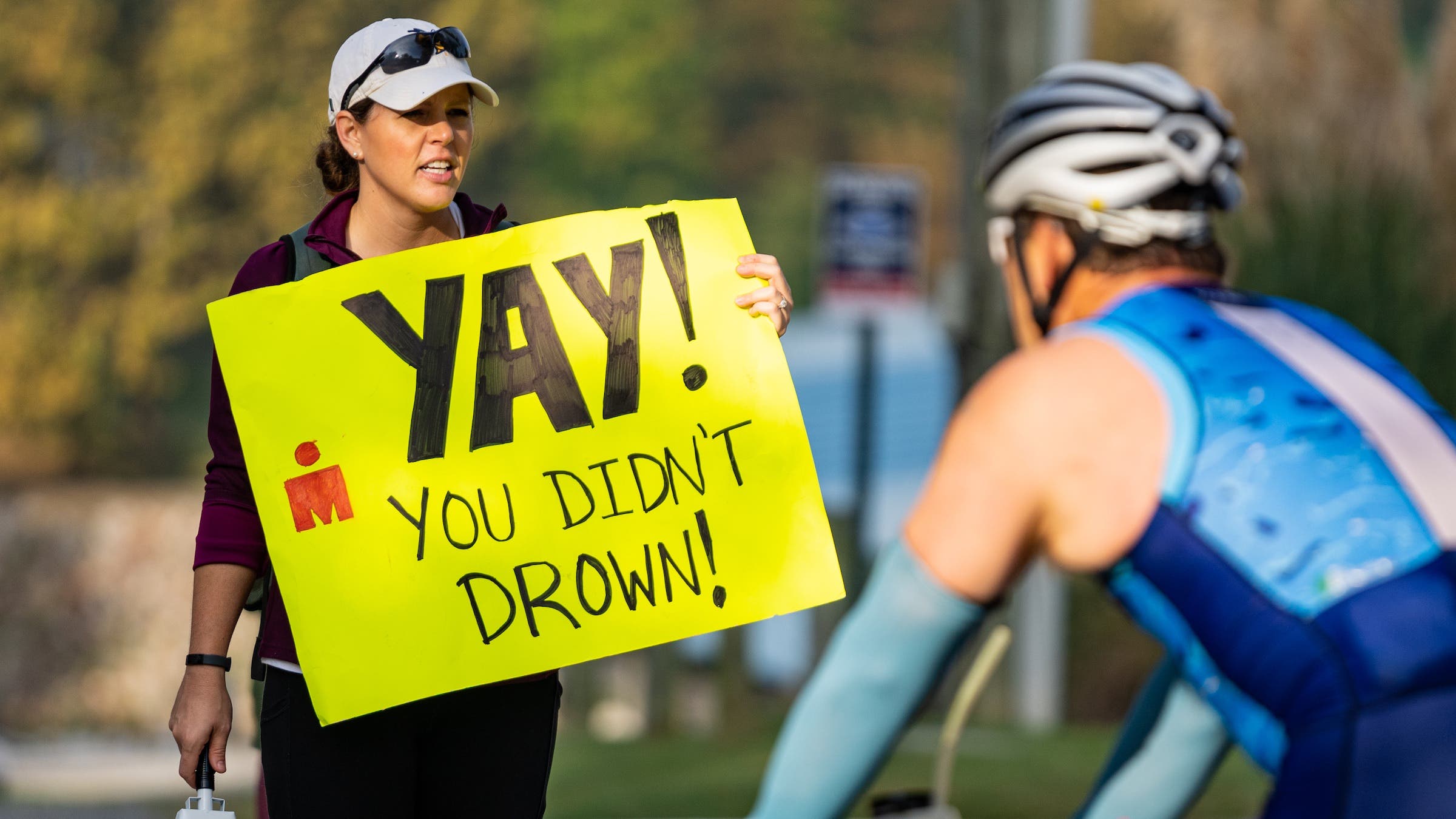Learn From Our Mistakes: Triathlete Editors on Their Worst Screw-Ups

(Photo: Felix Wong/Getty Images)
We like to tell would-be-triathletes they should never be afraid to just jump in and learn as they go. Triathlon is a welcoming sport, other athletes will help you navigate the course, and everyone makes mistakes as they learn. Literally, everyone.
And so our staff is here to share some of their worst (and silliest) mistakes. That way you don’t make the same ones; instead, you can get out there and make new mistakes that are entirely your own.
My Big Mistake: Fighting with the Competition
Call it the feistiness of youth. Call it adrenaline-instigated aggression. You could even call it assault. Though I didn’t end up in the slammer, my worst racing mistake was totally self-inflicted and totally dumb.
It was early in my pro ITU career (either the first year or my second, my memory is hazy there, you’ll see why), and I was racing in a small town in upstate New York. It was an in-water start, and like all ITU races, the swim was essential to making the bike pack, being in the race on the run, and flying home with much-needed points (and ideally a few bucks…).
The gun went off, and I was immediately pummeled, as usual. But this time, for some reason, the pummeling didn’t stop after the first few seconds, it only got worse, and it felt like it was coming from one place. So rather than swim away, I returned fire. He fired back again. It wasn’t long before we were both fully vertical in the water, literally punching each other. I mave have even grabbed his shoulder, hockey-fight-style, for better leverage.
After a few weak triathlete (not hockey player) swats at each other, we both simultaneously realized that we were now nearly alone in the water, and the pack was long gone. Accordingly, I had a horrible swim, followed by a horrible bike, and a pointless run. I wasted an entire trip to the East Coast, walked away with almost no points, and certainly no money in my pocket. It was dumb, and it only resulted in a bruised face and an even more banged-up ego. The only positive? I learned not to let emotion take over in the swim (and fortunately no one filed charges).
– Chris Foster, executive editor
Lesson: Don’t let your ego get the better of you.
My Big Mistake: Visiting Chafe City
I’m not a super-serious racer. To me, race day is a party where the nice people at the aid stations serve you cookies and punch every other mile. In fact, my husband Neil likes to tell the story of how we met during a race to illustrate this very point: He was heading out to start the run leg of a local half-iron, where he was leading his age group. I was on my way to the finish line of the concurrent Olympic-distance event. When he spotted me, I had a flower from the roadside weeds tucked behind my ear.
“Are we having fun yet?” I hollered across the road at the cute stranger. (I never claimed to be good at pickup lines, OK?) Neil shot me a look that very clearly said, What the hell are you doing picking flowers during a race?
I tell you this story because this is one of the rare times goofing around worked in my favor. Most of the time, I goof a little too hard. One time, while running backwards to cheer on a training buddy who needed a mid-race boost, I fell into a ditch. Another time, I crashed my bike into a construction barrier while singing show tunes.
But my biggest goof, by far, was my costume phase. Early in my triathlon career, someone shared a website where I could buy swimsuits with silly designs—an old-timey sheriff with teeny-tiny denim briefs, for example, or a sparkly disco-themed one-piece. I bought a few for Masters swim, then a few more for a local open-water swim competition. Weird swimsuits were my thing, man. I decided to go all-in on this by wearing a Captain America swimsuit and mask for an Olympic-distance triathlon, carrying the signature vibranium shield for the run. If the elite women could race in a swimsuit, so could I.
From the time I rolled into transition, it was clear my decision was a good one. People loved the costume, and I’m not gonna lie—I loved the attention. It made me happy to make my fellow racers happy. It was awesome! Until it wasn’t.
Here’s the thing about the elite women racing in swimsuits: they’re freaking elites. They finish in half the time I do, and they very clearly do not have chub rub. Reader, I chafed. I chafed in places I didn’t even know it was possible to chafe, and to this day, I still have scars from said chafing. I may have been dressed as a superhero, but by the time I finally crossed the finish line, I was bleeding and limping like I had just lost a fight to the Red Skull.
– Susan Lacke, digital editor
Lesson: There’s a reason tri suits have shorts. Wear them. And for heaven’s sake, Body Glide.

My Big Mistake: Trusting a Dude on the Internet
In general, I believe the fifth discipline of triathlon is problem solving and you can come back from almost any mistake (and, trust me, I have). Thought the lifeguards were yelling at me because I was winning, not because I had swum off-course and was about to hit a pile of rocks? Done it. Got stuck trying to climb a barricade in my wetsuit because I was in the wrong section of transition? Did it and everyone saw. Only sunscreened one arm? Swam into a school of jellyfish? Forgot key gear and all my nutrition on race morning? Done, done, and done.
But the one thing I’ve learned over the last couple of years is that I can problem solve and problem solve and problem solve right up until I can’t. When I’m done, I’m done. What I do not do well is race (or train) when I’m emotionally exhausted—and if all of those reserves are tapped out before the gun goes off, it ends really really badly for me. Stress is stress, as they say.
This came to a particular head at Ironman Lake Placid a few years ago. Friends and the Ironman Lake Placid Facebook group had recommended renting from this guy, let’s call him “Jeff,” who seemed to know everyone and was setting up cheap houses for athletes. My parents were supposed to fly out and meet me for the race, so I talked to “Jeff” and paid for an inexpensive room for them and a room for me, at a house right in town.
As we got closer to race day, I kept getting assurances from him that it would all work out, but not a lot of details. When I pulled up to the address he had finally given me and knocked on the door, a very confused athlete opened it and told me: No, he had rented this house directly from the owners, he had no idea who “Jeff” was.
OK, fine, we problem solve.
Lots of texting and calling “Jeff,” and showing up at another house in town, waiting for him, lots of talking (from him) and schmoozing and how was I doing. Fine, Jeff, I just want somewhere to sleep. He put me in a hotel that night, but a whole bunch more explanations and talking led to being moved to what appeared to be an abandoned house 20 minutes outside of town. (And, of course, I hadn’t rented a car because I was trying to save money.) It was supposedly empty because it was on the market, but it smelled like mold and the fridge didn’t work and I’m still not sure we weren’t squatting in it. There weren’t enough beds for everyone who had been sold rooms that didn’t exist by Jeff, and I ended up sleeping on a couch—except I didn’t sleep, I had one of those nights where you’re awake on and off all night, and I was so tired the day before the race that I was nauseous and dizzy.
Through all of this I kept just trying to solve the immediate next problem and not waste time being mad about it. Ultimately, there were many reasons that race went shockingly badly for me, but one of them was definitely that by the time I got to the start line all I wanted to do was sleep in a clean bed without having to spend energy negotiating for that bed.
Yes, I did Google Jeff later and it turned out he had already been convicted of white-collar check fraud—something that might have been good to know in advance.
– Kelly O’Mara, editor-in-chief
Lesson: Spend the money on the nicer place to stay, the rental car, the things that eliminate stress. You’ve spent this much time and energy getting here, don’t waste it cutting corners.
My Big Mistake: Not Listening to My Body
There’s no gigantic mistake I can look back on (well, that I’m willing to share in a public place, anyway) and say, “Oh, that was truly catastrophic” but what I will say is that it’s often the “little” mistakes that add up over time that can get you in the hottest water. For me, that was often squeaking out one last hard workout when it would have been way smarter to cut it or drop the intensity entirely, or to not keep running when my foot is really not feeling right, but “ah, yes, it’ll be OK for another mile….” Oh wait, it isn’t.
The moral of the story here is that learning to listen to your body isn’t easy, and even when you have acquired that skill (which most definitely takes time) then it can still be hard to truly have the confidence to stop and listen. If you’re new to the sport, try to surround yourself with good people (coaches, trusted friends/training partners) who can help you identify when it’s time to peel back or stop. Over time, you’ll learn to recognize these things for yourself. For those who are more seasoned triathletes but still struggle with this, try to really tune into how your body is feeling—and, perhaps more importantly, how you’re feeling emotionally. Are you feeling tired, low on enthusiasm, not looking forward to the workout, wishing it was over already? These are all very good signs to cut the workout, hit the couch, and have an early night (maybe even a string of them). Ultimately, your body (and brain) will thank you for it.
– Emma-Kate Lidbury, managing editor
Lesson: Have the confidence to stop and listen to your body.

My Big Mistake: Racing Without Soul
Ironman Chattanooga is not a race you run expecting to PR. The Appalachian foothills of southern Tennessee stay steamy throughout September, and the roller-coaster profile is no cakewalk. Sure, the down-current river swim can be very fast if you catch the dam release just right, but the bike course takes time back with its four bonus miles—all 116 of them on a double lollipop loop that punishes you with nearly 5,000 feet of climbing. And the run course? Triathlete rated it one of the five toughest on the circuit.
And yet I’ve achieved my two most satisfying PRs in Chatty. Why? Because I did something out of character: I raced with emotion.
Coming into IMCHOO in 2017, I was a wreck. My father had died suddenly three weeks earlier, and my taper turned into long hours of paperwork, funeral planning, and slow walks around the neighborhood with my mother. In 2021, I arrived 10 pounds overweight and at least 10% under-trained following an utterly chaotic work year.
After my dad’s passing, I spent about a third of the race trying to lock into “cyborg” mode, my usual uber-serious, high-focus headspace. But it didn’t work. My mind wandered from pace calculations to memories of the many times he challenged or cheered me. By the midpoint of the marathon, tears were streaming down my face, with sadness but also with gratitude for the determination he’d instilled in me. The last 10 miles—usually such a grind—turned into a celebration of that helped me drop 12 minutes off my previous best Ironman time.
Four years later, knowing my fitness was lacking, I applied 2017’s lesson and opened my heart to the experience in a way I’d never done. On the bike course, I soaked up the scenery and imagined the Civil War battles that played out along those roads 150 years earlier. On the run, I high-fived little kids and enjoyed the simple pleasure—nay, privilege—of every easy stride. I even stopped to chug a beer at the top of the second lap with a small crew of rowdy spectators. The result: another 5 minutes off my PR.
Was there cause-and-effect at work? I couldn’t prove it, and I certainly wouldn’t have made it over those hills without a solid base of endurance training. But I know that dialing back my intensity improved my performance. Perhaps it was physical: We know that stress causes inflammation among other issues. Or maybe it was mental: We also know that joy is a powerful stimulant. Either way, I’m now ready to tackle my next biggest mistake—a propensity for late-night chocolate cookie binges.
– Jonathan Dorn, vice president
Lesson: Channel your grief—or joy—into positive energy. Look at the scenery more, and your watch less. Chug a beer on the second lap.